HIPAA‑Compliant Scheduling for Small Clinics: Everything You Need to Know in 2025
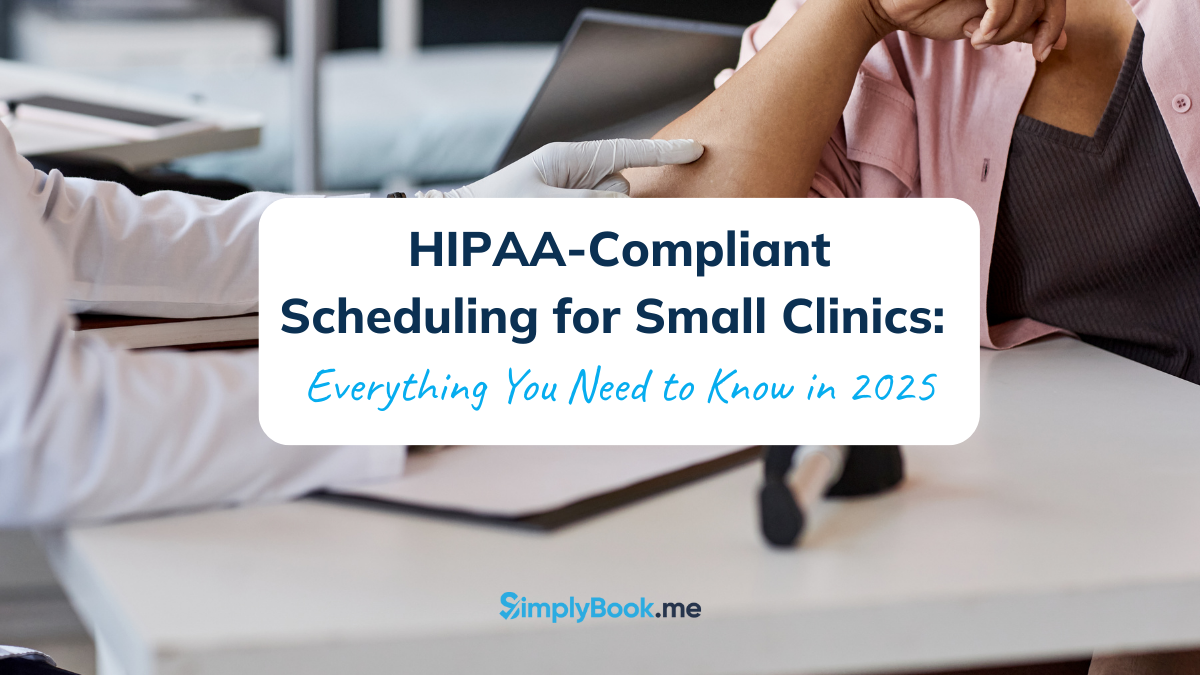
This post is also available in:
![]()
![]()
![]()
![]()
![]()
![]()
![]()
![]()
In 2025, patient data security is not only a regulatory obligation but also a pillar of patient trust. Small clinics and healthcare practices face mounting pressure to adopt digital systems that make it easy for patients to book care online. According to industry studies, over 70% of patients now prefer online scheduling for clinics rather than calling by phone. Convenience, however, must not come at the cost of compliance.
The Health Insurance Portability and Accountability Act (HIPAA) sets clear rules on how clinics must manage Protected Health Information (PHI). A single violation, such as exposing PHI in an insecure appointment reminder, can result in regulatory penalties that range from $100 to $50,000 per incident. For small practices with limited budgets, one breach can be financially devastating.
That is why clinics are turning to HIPAA compliant scheduling software. These solutions combine the ease of online booking with the safeguards needed to remain compliant. Instead of relying on generic scheduling apps, small and mid-sized providers can choose specialized platforms that encrypt patient data, restrict access, and keep audit logs.
In this article, we will:
- Break down HIPAA’s core requirements for appointment scheduling.
- Explore the challenges small clinics face in compliance.
- Show how SimplyBook.me’s HIPAA compliant scheduling software enables small clinics to book patients securely.
- Provide best practices and a look at future healthcare scheduling trends in 2025.
By the end, you’ll know exactly why compliance is critical, what features to look for in a scheduling platform, and how SimplyBook.me ensures both security and simplicity for healthcare providers.

What is HIPAA-Compliant Scheduling Software?
At its core, HIPAA compliant scheduling software is an appointment management system specifically designed for healthcare providers. Its main function is to protect Protected Health Information (PHI) during every step of the medical appointment booking process. Unlike general-purpose scheduling tools, these platforms are tailored to healthcare’s strict legal framework.
Here’s what sets them apart:
- Encryption by Default
All PHI is encrypted both while being transferred (for example, when a patient books online) and while stored in the system. This prevents unauthorized access even if a network or device is compromised. - Strict Access Controls
Access is granted only to authorized users based on role. For example, front-desk staff may only see appointment times, while clinicians can view additional notes. This ensures privacy without hindering operations. - Audit Logging
Every login, edit, or deletion is tracked. Audit trails provide accountability and allow clinics to prove compliance during HIPAA audits. - Secure Communication
Appointment confirmations or reminders are sent without revealing sensitive details. A compliant reminder might say “You have an appointment at 10:00 AM” without mentioning medical conditions or treatments. - Business Associate Agreement (BAA)
The software vendor must sign a BAA with the clinic. This legal contract confirms the vendor is also bound to HIPAA compliance, closing the loop on data protection responsibilities.
For small and mid-sized practices, these safeguards are critical. Generic scheduling apps may offer convenience, but they often lack encryption, secure notifications, or a BAA. Using them exposes clinics to major compliance risks.
As Giva explains, HIPAA-compliant solutions are more than a technical upgrade — they are an investment in patient trust. Patients want to feel confident that their clinic takes privacy seriously. By adopting compliant tools, providers can deliver both the modern convenience of online scheduling for clinics and the security of regulated healthcare systems.

Key HIPAA Requirements for Online Scheduling
To qualify as truly HIPAA compliant scheduling software, a platform must follow strict safeguards outlined in the law. These safeguards apply to every step of the patient booking journey, from the moment a patient selects an appointment slot to how the clinic stores that data afterward.
1. Data Encryption
All patient data must be encrypted both during transmission and at rest. For example, when a patient books through a website, encryption prevents hackers from intercepting their information. Without encryption, even something as simple as an appointment time linked to a name can qualify as Protected Health Information (PHI).
2. User Authentication
Multi-factor authentication is no longer optional. Systems must verify user identity using methods like Google Authenticator or SMS verification. This prevents unauthorized logins — especially important if staff devices are lost or stolen.
3. Role-Based Access Controls
Not every staff member needs access to the same level of data. Reception staff may only need to view appointment slots, while doctors require more detailed access. Role-based permissions minimize unnecessary exposure of PHI and keep sensitive information limited to those who need it.
4. Audit Trails
Every login attempt, update, and deletion must be logged. These audit trails create accountability and allow clinics to prove compliance during HIPAA audits. For instance, if regulators request evidence, the clinic can show exactly who accessed PHI and when.
5. Secure Notifications
Appointment reminders and confirmations must never contain PHI. A compliant SMS reminder might say, “Your appointment is tomorrow at 9:00 AM.” An insecure message that says, “Your diabetes consultation with Dr. Smith is tomorrow” would be a direct violation.
6. Automatic Logouts and Data Retention
To protect against unauthorized access, platforms must log users out automatically after inactivity. Data retention policies are also required, ensuring PHI is not stored longer than necessary.
As Sprinto explains, these features are the foundation of compliance. By embedding encryption, secure communication, and accountability, clinics can ensure patients enjoy the ease of online scheduling for clinics without risking their privacy.
When these requirements are ignored, violations can lead to fines of up to $1.5 million annually per category, according to the Department of Health and Human Services. For small clinics, even a single violation could be financially catastrophic. This makes it essential to choose a platform designed with compliance in mind rather than adapting a generic system retroactively.

Challenges for Small Clinics in Achieving HIPAA Compliance
Large hospitals usually have compliance officers and IT departments dedicated to protecting data. Small and mid-sized clinics, however, often lack these resources. This makes HIPAA compliance more difficult, even though they face the same legal responsibilities.
1. Limited Budgets and IT Resources
Smaller practices often operate on tight margins. Investing in secure servers, in-house IT staff, and advanced cybersecurity measures may feel unrealistic. Yet HIPAA does not excuse clinics based on size — the same standards apply.
2. Staff Training Gaps
Unlike larger organizations, small clinics may not run ongoing HIPAA training. A receptionist accidentally including medical details in a reminder email, or leaving a system logged in overnight, can trigger compliance violations. These seemingly minor mistakes can have major consequences.
3. Reliance on Non-Compliant Tools
Some clinics still use free or low-cost scheduling software designed for salons, gyms, or general businesses. While these tools may be user-friendly, they often lack encryption, audit logs, or Business Associate Agreements (BAAs). Using them places the clinic at risk.
4. Legal and Reputational Risks
HIPAA violations can result in fines from $100 to $50,000 per violation, capped at $1.5 million per year for each violation category. For a small practice, even one fine could mean cutting services, staff reductions, or closure. The reputational damage can be equally severe — patients may not trust a clinic that failed to protect sensitive data.
As Loricca highlights, smaller healthcare providers are often the most vulnerable to breaches because they rely on outdated systems. Criminals know this, making them frequent targets of phishing and ransomware attacks.
By adopting a specialized platform like SimplyBook.me, small clinics can offset these challenges. Instead of building HIPAA safeguards from scratch, they can use software that already incorporates encryption, audit logging, and role-based permissions.

How SimplyBook.me Ensures HIPAA Compliance
For small and mid-sized healthcare providers, SimplyBook.me offers a ready-to-use solution that takes the guesswork out of compliance. Its HIPAA mode has been built to align with regulatory requirements while keeping the platform intuitive for both staff and patients.
1. Two-Step Authentication
Users are required to verify their identity with both a password and a second factor such as Google Authenticator or SMS verification. This drastically reduces the risk of unauthorized account access if credentials are stolen.
2. Automatic Timeout Settings
The platform automatically logs out users after a period of inactivity. This prevents sensitive data from being exposed if someone forgets to log off or leaves a workstation unattended.
3. Restricted Support Access
Even SimplyBook.me’s own support staff cannot access a clinic’s booking system or patient data. This minimizes third-party exposure and ensures PHI remains under the clinic’s control.
4. Encrypted Data Storage
Every piece of PHI — from names and phone numbers to appointment notes — is encrypted both during transmission and while stored on servers. This is a fundamental requirement for HIPAA compliant scheduling software.
5. Audit Logs
The system records every action taken by users, from logins to data updates. Clinics can review these audit trails to detect suspicious behavior and prove compliance during HIPAA audits.
6. Secure Booking Pages
Patients access SSL-protected booking portals, which can be embedded directly into a clinic’s website. This provides a seamless experience while ensuring all data entered is encrypted.
7. Configurable HIPAA Mode
Through the SimplyBook.me dashboard, clinics can activate HIPAA compliance features. This includes enabling two-factor authentication, enforcing secure notifications, and limiting the content of reminders to exclude PHI.
As the SimplyBook.me HIPAA guide explains, these features allow small clinics to meet regulatory standards without sacrificing usability.
Mini Case Study: A Small Clinic’s Transition to HIPAA-Compliant Scheduling
Consider a three-provider family clinic in Ohio that previously relied on a free scheduling app. Patients could book online, but reminders often included details like “Annual diabetes check-up,” a direct HIPAA violation. After adopting SimplyBook.me, the clinic activated HIPAA mode, ensuring reminders contained only time and date details. Staff began using two-step authentication, and audit logs gave managers visibility into system activity.
The result? Patients appreciated the smoother online scheduling process, and the clinic passed its next compliance review without issues. What seemed like a technical challenge became a competitive advantage.
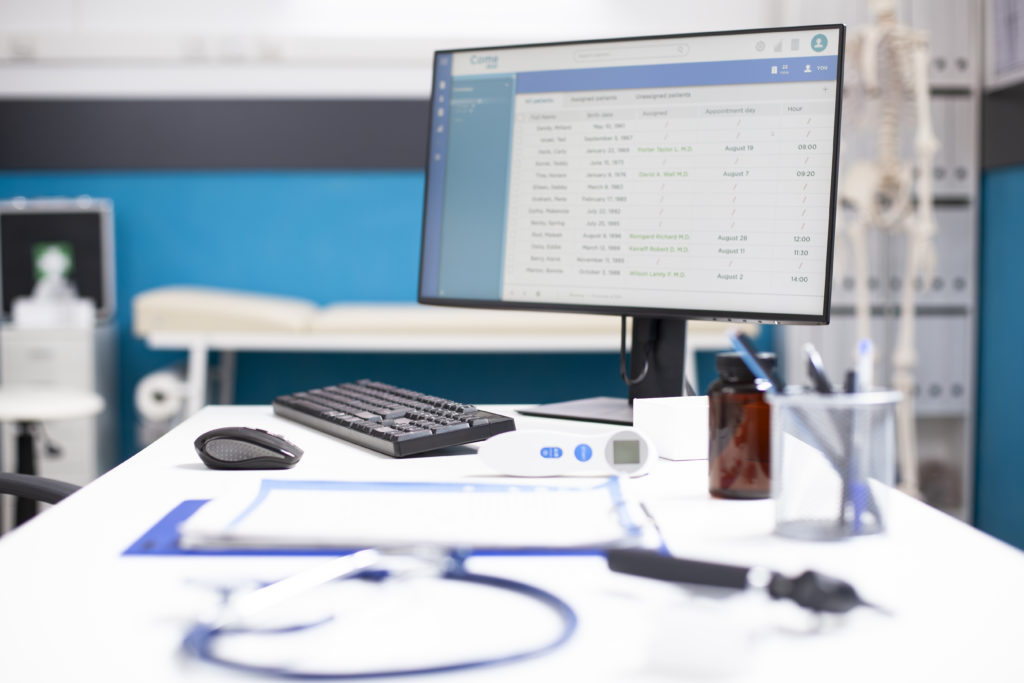
Benefits of HIPAA-Compliant Scheduling for Small Clinics
Adopting HIPAA-compliant scheduling is more than meeting a legal requirement — it reshapes how small clinics operate, strengthening both internal efficiency and patient trust.
1. Enhanced Patient Data Security
The most obvious benefit is the protection of PHI. With encryption, role-based permissions, and secure notifications, clinics minimize risks of breaches. Patients feel more confident when they know their information is handled with care.
2. Operational Efficiency
Automated booking and reminders reduce the burden on administrative staff. Instead of spending hours managing calls, staff can focus on patient care. Clinics also avoid costly errors that can occur with manual scheduling.
3. Regulatory Compliance
HIPAA penalties can reach millions of dollars annually per violation category. By using HIPAA compliant scheduling software, clinics avoid fines and the stress of non-compliance.
4. Patient Trust and Retention
When patients see that a clinic prioritizes confidentiality, they are more likely to return and recommend services to others. Privacy has become a deciding factor in choosing a healthcare provider. A recent report from Emitrr shows that clinics using secure booking systems report higher patient satisfaction scores.
5. Scalability and Growth
SimplyBook.me adapts to the needs of small and mid-sized clinics alike. As practices grow — adding new providers, services, or locations — the platform scales while keeping HIPAA safeguards intact. This flexibility ensures long-term compliance without forcing clinics to switch systems.
HIPAA-compliant scheduling is not just about checking regulatory boxes. It’s about creating a modern, trustworthy patient experience while giving clinics the tools to operate more effectively.
Best Practices for Clinics Using HIPAA-Compliant Scheduling
Even with a compliant platform, clinics must adopt strong practices to maintain security and compliance:
- Staff Training: Every team member should understand HIPAA rules and how to use the software properly.
- Multi-Factor Authentication: Ensure every user account requires two-step verification.
- Audit Review: Regularly check access logs to detect unusual activity.
- Notification Management: Appointment reminders should never contain PHI. SimplyBook.me ensures compliance by limiting reminder content to essential details.
- Automatic Logout & Retention: Configure settings to automatically log out inactive users and define how long records are stored.
By combining SimplyBook.me’s features with proactive staff training, clinics can create a scheduling system that remains compliant, secure, and efficient.
Future Trends in HIPAA-Compliant Scheduling
The landscape of healthcare scheduling continues to evolve, and in 2025 several trends stand out:
1. AI-Powered Scheduling
Artificial intelligence is being integrated into scheduling platforms to predict patient needs, suggest optimal appointment times, and reduce no-shows. Clinics benefit from improved efficiency, while patients enjoy smarter booking options.
2. Integration with Telehealth
As telemedicine remains popular, secure scheduling systems must manage both in-person and virtual appointments. HIPAA-compliant tools like SimplyBook.me ensure that whether the visit happens in-clinic or online, PHI remains protected.
3. Increased Patient Expectations
Patients increasingly expect the same seamless digital experiences they enjoy with retail or travel apps. At the same time, they are becoming more aware of privacy. This dual demand makes HIPAA compliance a competitive advantage.
4. Stricter Regulatory Oversight
Healthcare regulators are placing greater scrutiny on digital health platforms. Small clinics that invest early in secure systems will be better positioned to adapt as rules tighten further.
By staying ahead of these trends, SimplyBook.me ensures its clients remain compliant while also providing the user-friendly features patients expect in 2025.
Conclusion
HIPAA compliance is more than a legal framework — it is a foundation of patient trust. For small clinics, choosing a secure scheduling platform is essential not only to avoid fines but also to provide a safe and modern patient experience.
SimplyBook.me’s HIPAA compliant scheduling software gives clinics everything they need: secure booking portals, encryption, audit logs, two-step authentication, and automatic timeouts. These features protect PHI while allowing patients to enjoy convenient online booking.
In a world where patient trust and data security define competitive advantage, SimplyBook.me enables clinics to thrive in 2025 and beyond.
Frequently Asked Questions
1. What makes scheduling software HIPAA compliant?
HIPAA-compliant scheduling software must include strong safeguards such as encryption of all patient data, multi-factor authentication, role-based access controls, and detailed audit logs. It also requires secure appointment notifications that avoid exposing PHI. Finally, the vendor must sign a Business Associate Agreement (BAA), which makes them legally responsible for handling patient data according to HIPAA standards. These measures ensure both compliance and patient trust in the booking process.
2. Why should small clinics invest in HIPAA compliant scheduling software?
Small clinics face the same regulatory requirements as large hospitals. Without a compliant system, they risk costly fines, reputational damage, and even patient loss after a data breach. HIPAA compliant scheduling software helps automate compliance, keeps PHI secure, and improves efficiency. It allows patients to book online confidently, knowing their information is safe. This combination of security, compliance, and patient trust makes investing in the right system essential for smaller practices.
3. How does SimplyBook.me protect patient data security?
SimplyBook.me safeguards PHI using encryption, SSL-secured booking pages, automatic logouts, two-step authentication, and detailed audit logs. Importantly, support staff cannot access a client’s data, minimizing risk. Patients use SSL-protected portals, ensuring all booking information is transmitted securely. Clinics can also enable HIPAA mode in the dashboard, customizing compliance settings. By combining these technical safeguards with easy-to-use workflows, SimplyBook.me ensures small clinics meet HIPAA standards without sacrificing usability or patient convenience.
4. Can appointment reminders still be sent under HIPAA rules?
Yes. HIPAA permits clinics to send appointment reminders, but they cannot include PHI such as diagnoses, treatments, or conditions. A compliant reminder might say, “You have an appointment tomorrow at 10:00 AM.” SimplyBook.me makes this easy by automatically formatting reminders to include only necessary details. Clinics can configure secure notifications in HIPAA mode, ensuring all communications remain compliant while still keeping patients engaged and informed about their upcoming appointments.
5. What are the risks of using non-compliant scheduling software?
Non-compliant scheduling software often lacks encryption, audit logs, or secure notifications. This means PHI could be exposed in emails, SMS, or data breaches. The consequences include fines up to $1.5 million per year for violations, lawsuits from affected patients, and permanent reputational damage. Small clinics are especially vulnerable because they lack large-scale IT resources to recover from breaches. Choosing a HIPAA-compliant solution is the safest way to protect patients and the clinic’s future.
6. Is SimplyBook.me scalable for larger practices as they grow?
Yes. SimplyBook.me is designed to adapt to the needs of both solo practitioners and expanding clinics. As practices add more providers, services, or locations, the platform can scale seamlessly while keeping HIPAA safeguards in place. Features like secure portals, audit logs, and role-based permissions grow with the clinic. This flexibility ensures compliance today and long-term adaptability tomorrow, making SimplyBook.me a future-proof choice for healthcare providers of all sizes.
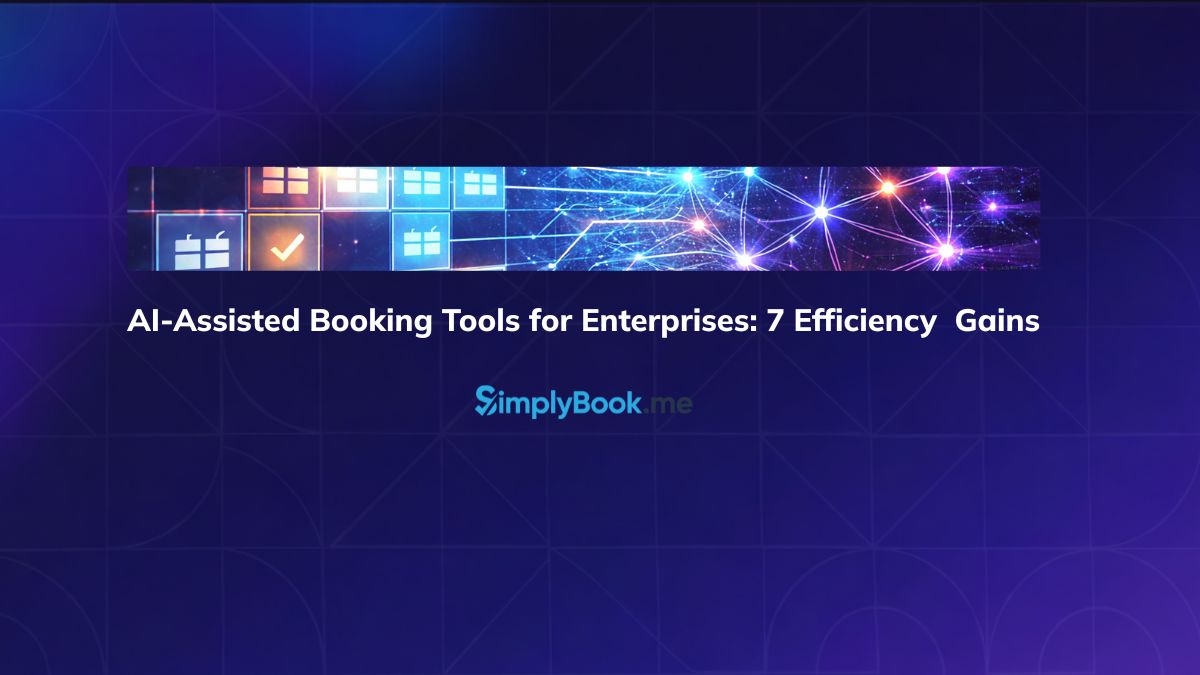
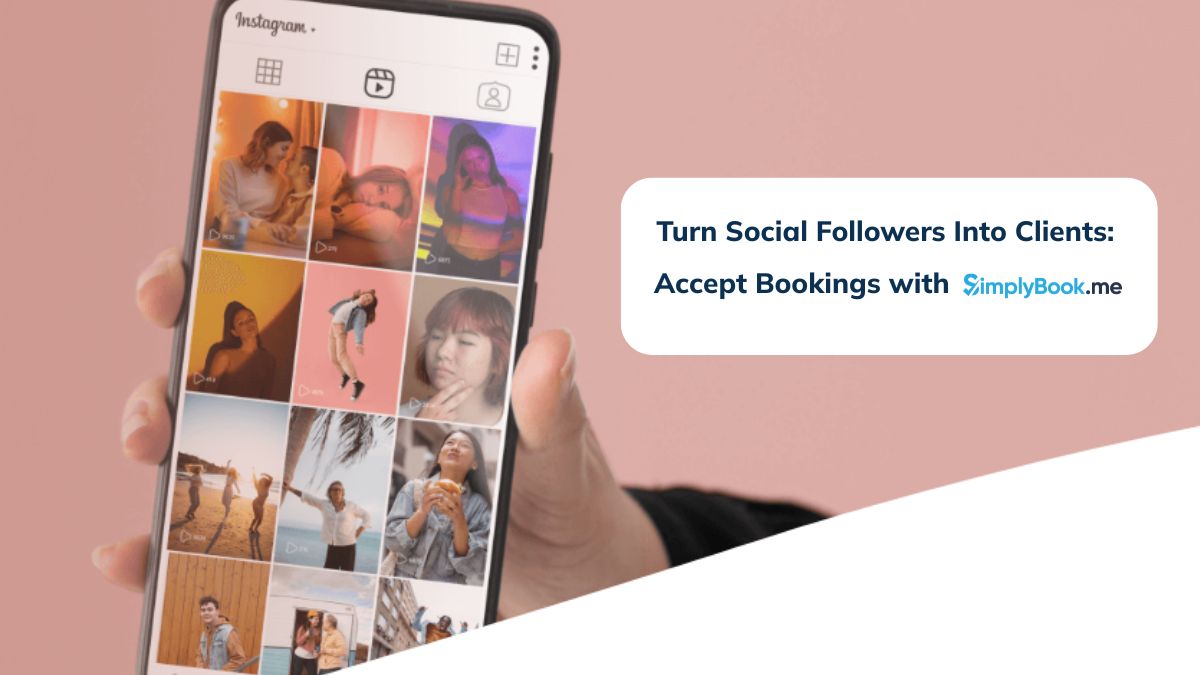
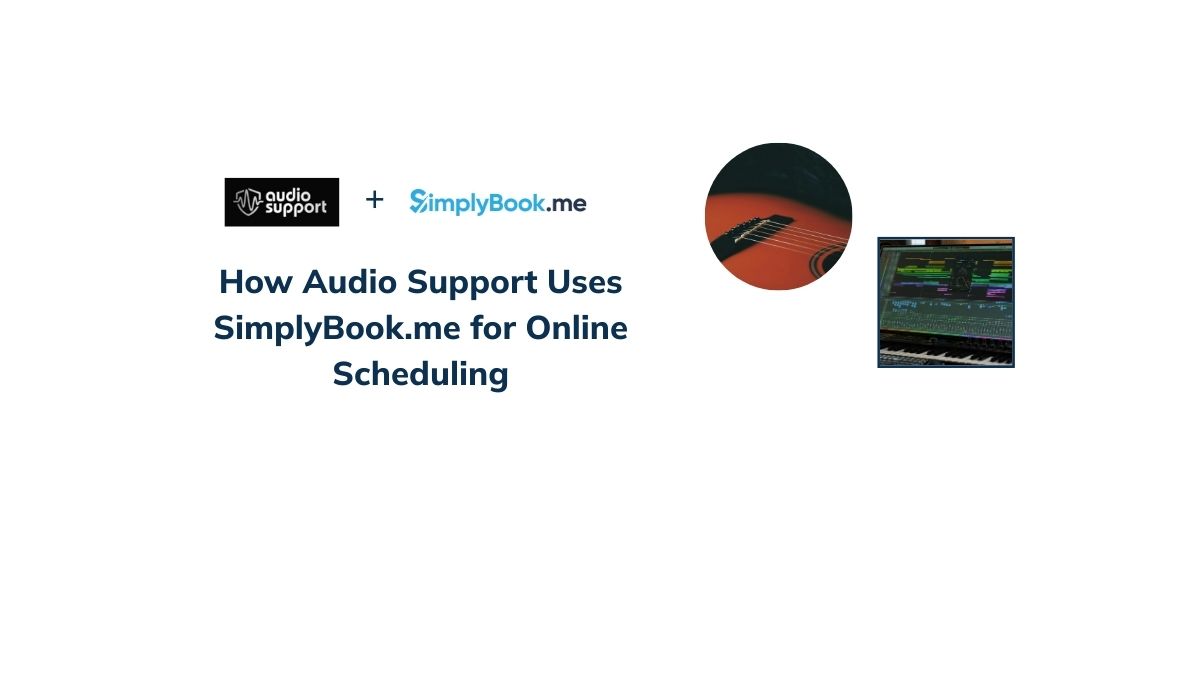
Comments
0 commentsNo comments yet